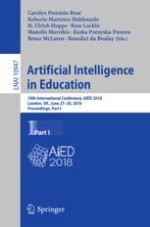2018 | OriginalPaper | Chapter
Do Preschoolers ‘Game the System’? A Case Study of Children’s Intelligent (Mis)Use of a Teachable Agent Based Play-&-Learn Game in Mathematics
Authors : Eva-Maria Ternblad, Magnus Haake, Erik Anderberg, Agneta Gulz
Published in: Artificial Intelligence in Education
Publisher: Springer International Publishing
Activate our intelligent search to find suitable subject content or patents.
Select sections of text to find matching patents with Artificial Intelligence. powered by
Select sections of text to find additional relevant content using AI-assisted search. powered by
